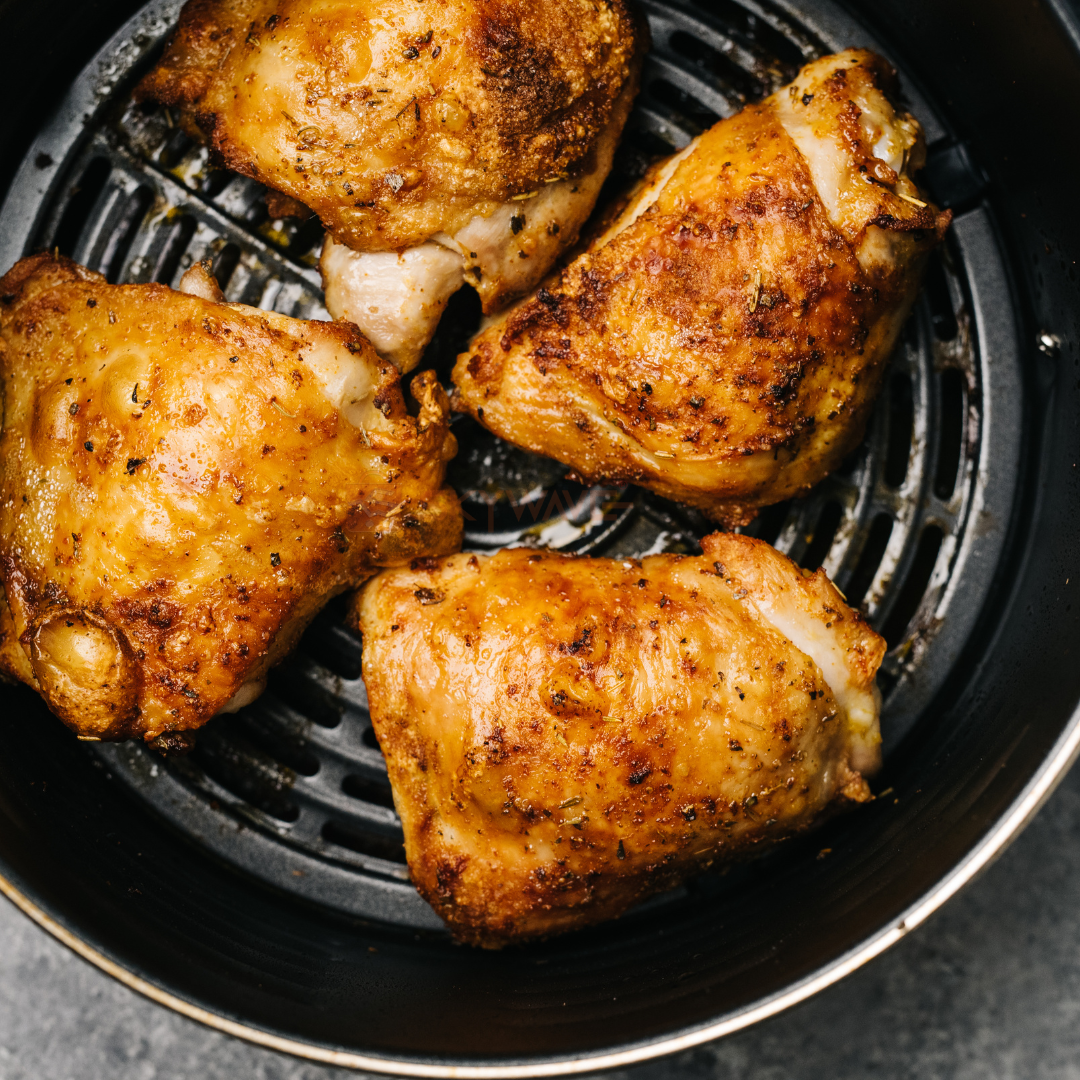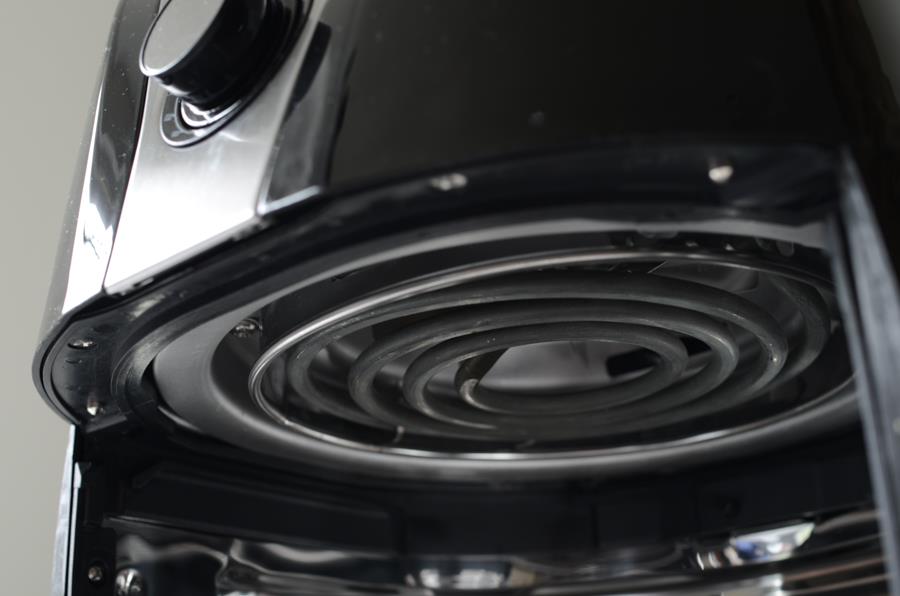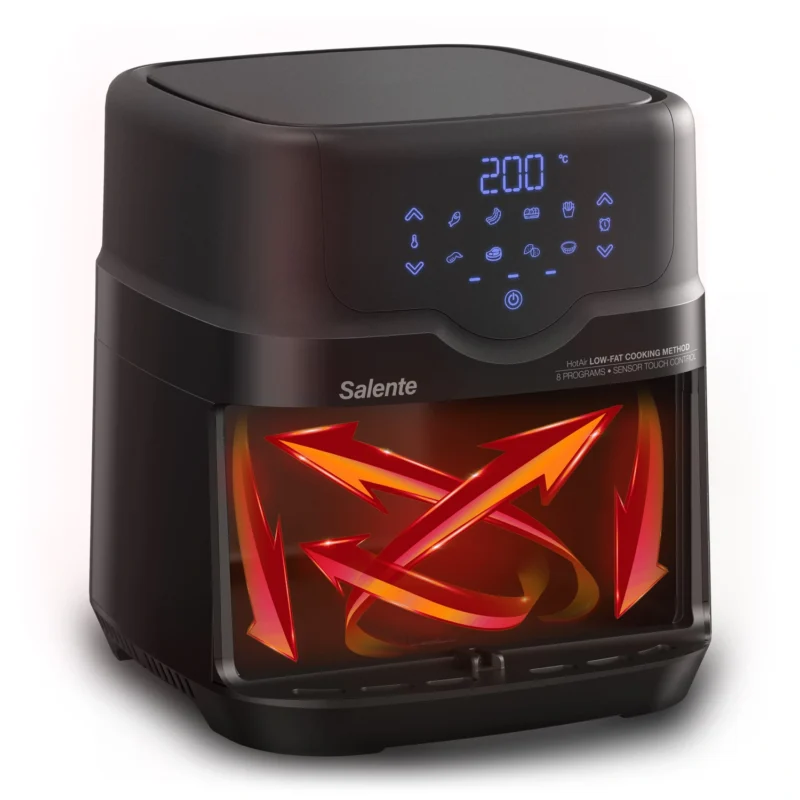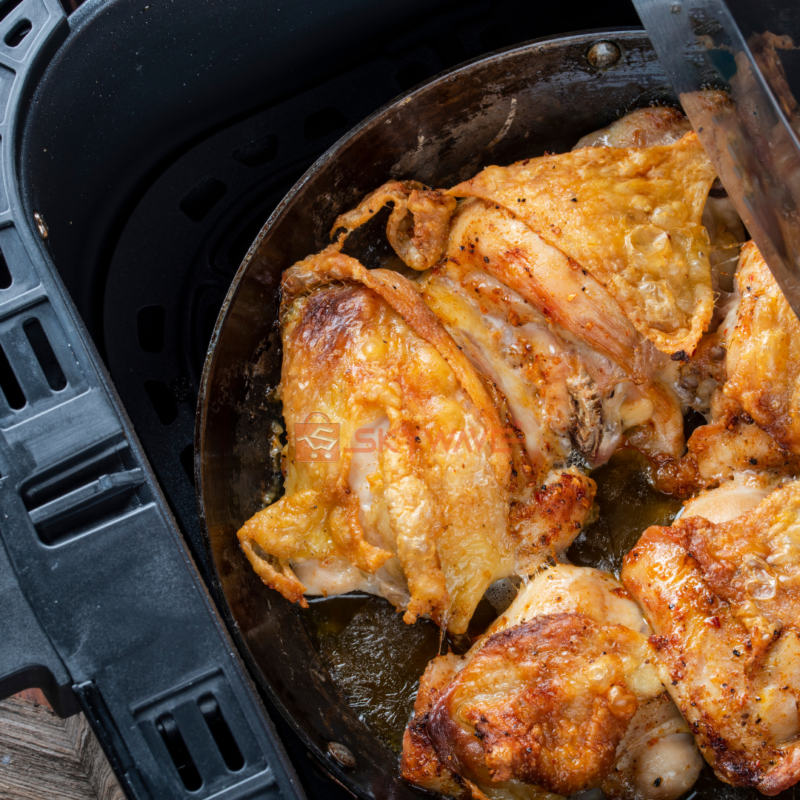Bado Moto: Discover Kenyan Cuisine with Your Air Fryer

Introduction
In recent years, the air fryer has emerged as a revolutionary kitchen appliance, transforming the way we prepare meals, traditional Kenyan cuisine is renowned for its vibrant flavors, hearty ingredients, and cultural significance. The use of an air fryer allows you to recreate these beloved recipes with a contemporary twist, making it easier to incorporate healthy cooking practices without compromising on taste. Whether you are a seasoned cook or a new in the kitchen, an air fryer can simplify the process and deliver consistent, delicious results. By leveraging this modern gadget, you can savor the rich flavors of Kenyan cuisine while enjoying the benefits of faster cooking times, healthier meals with minimal oil, and enhanced energy efficiency.
This guide aims to provide you with a comprehensive overview of how to cook popular Kenyan cuisine using an air fryer. From classic staples like samosas to mouthwatering nyama choma, we will cover a range of recipes that capture the essence of Kenyan cuisine. Additionally, you will find valuable insights into the optimal settings and tips to ensure your dishes are cooked to perfection. By the end of this post, you will be equipped with the knowledge and inspiration to bring the flavors of Kenya to your table with the convenience of an air fryer.
How an Air Fryer Works
Before we jump into the various Kenyan cuisines, let’s explain how they work with mechanical and scientific methods. An air fryer operates by utilizing a convection heating element combined with a powerful fan to circulate hot air around the food. This mechanism is akin to a miniature oven, ensuring that the food is cooked evenly on all sides. The air fryer’s design features a perforated basket that allows hot air to encompass the food, achieving a balance between crispy exteriors and moist interiors, which is ideal for preparing various Kenyan foods. Here is a simple step that we have created for you to understand how they work.

After you plug in the air fryer and turn it on. Electricity flows to the heating element., the heating element heats the air inside the cooking chamber. The heating element in an air fryer is located at the top of the cooking chamber. Imagine the heating element as the “ceiling” of the air fryer’s cooking chamber.

The fan then circulates this hot air around the food at high speed, mimicking the effect of deep frying but using air instead of oil. This process ensures even cooking and a crispy outer layer. The rapid air circulation within the air fryer relies on the principle of convection. Hot air rises, drawing cooler air downwards. The fan continuously disrupts this natural flow, forcing the hot air to constantly move around the food, ensuring even cooking.

The high temperature and rapid air circulation achieved by the air fryer (often exceeding 400°F) promote the Maillard reaction. This chemical reaction occurs when the amino acids and reducing sugars in food are exposed to heat, forming complex flavor compounds and a browned, crispy crust. Then your food is cooked.
Here is a guide to air fryers. Get to know the types of air fryers and factors to consider before buying an air fryer.
Popular Kenyan Foods You Can Cook in an Air Fryer
Kenyan cuisine offers a rich palette of flavors, and the air fryer can be a convenient tool to prepare these delicious dishes. Here are some popular Kenyan foods that can be cooked in an air fryer, along with their specific settings:
- Chicken Wings: Marinate the wings with Kenyan spices and air fry at 375°F (190°C) for 20-25 minutes. Turn halfway for even crispiness.
- Nyama Choma (Grilled Meat): Once marinated, preheat the air fryer to 370°F (188°C). For beef and goat, a cooking time of approximately 15-20 minutes is recommended. Chicken, being more delicate, requires a slightly shorter cooking time of around 12-15 minutes.
- Fish Fingers: Coat fish fillets with a seasoned breadcrumb mixture and air fry at 400°F (200°C) for 10-12 minutes. Ensure they are golden and crispy.
- Samaki wa Kukaanga: This traditional fried fish can be made healthier by air frying at 380°F (193°C) for 15-20 minutes.
- Viazi Vitamu: Sweet potato fries, a staple in Kenyan cuisine, can be air-fried at 360°F (182°C) for 15-18 minutes. Toss halfway for even cooking.
- Mandazi: These sweet, fluffy doughnuts can be air-fried at 350°F (175°C) for 10-12 minutes. Brush with a bit of oil for a golden finish.
- Kachumbari: While traditionally a fresh salad, you can air fry ingredients like tomatoes and onions at 350°F (175°C) for a roasted twist.
- Crispy Cauliflower Florets: Seasoned with Kenyan spices, air fry at 375°F (190°C) for 12-15 minutes until crispy.
- Samosas: These savory pastries filled with minced meat or vegetables can be air-fried at 375°F (190°C) for 10-15 minutes.
- Spring Rolls: Kenyan-inspired spring rolls can be air fried at 375°F (190°C) for 8-10 minutes, ensuring they are crunchy.
- Bhajia: Potato fritters can be air fried at 360°F (182°C) for 12-15 minutes, perfect for a crisp texture.
- Smokie: Kenyan-style sausages can be air fried at 400°F (200°C) for 8-10 minutes for a quick snack.
- Leftover Chapati: Reheat chapati at 320°F (160°C) for 2-3 minutes to restore its softness and warmth.
- Pastries: Various Kenyan pastries can be air fried at 350°F (175°C) for 8-10 minutes, achieving a perfect golden-brown crust.
- Maru Bhajia (Potato Slices): Preheat the air fryer to 360°F (180°C). Air fry for about 15-20 minutes.
- Kebabs: Cook them at 200°C for approximately 15-20 minutes, turning them halfway through the cooking time to achieve an even, golden-brown finish.
- Vegetable Skewers: Preheat your air fryer to around 375°F (190°C). Air fry the vegetable skewers for approximately 10-15 minutes.
These Kenyan cuisines demonstrate the versatility and convenience of using an air fryer, allowing you to enjoy traditional flavors with a healthier twist.
Basic Air Fryer Controls
The air fryer has revolutionized how we prepare foods, including beloved Kenyan cuisine. Understanding its basic controls is crucial for optimizing your culinary experience. The most fundamental components you’ll encounter on an air fryer are the timer, temperature settings, and sometimes a preheat function. Mastering these controls is essential for achieving the perfect texture and flavor in your Kenyan cuisine.
1. Timer
First, let’s discuss the timer. Most air fryers come equipped with a timer that ranges from 1 to 60 minutes. This feature allows you to set the cooking duration precisely, helping you avoid overcooking or undercooking your meals. For instance, crunchy samosas might require a timer setting of 15 minutes, while more delicate items like sukuma wiki (collard greens) might need just 7-10 minutes.
2. Temperature control
Next is temperature control, which is vital for adjusting the heat according to the type of food you’re preparing. Air fryers typically offer a range from 180°F to 400°F (82°C to 204°C). Higher temperatures are excellent for achieving crispy textures, such as those desired in fried chicken or mandazi (Kenyan doughnuts). On the other hand, lower temperatures are more suitable for delicate vegetables and fish. For example, cooking nyama choma (grilled meat) might require a setting of around 375°F (190°C) to ensure it remains juicy while forming a crispy outer layer.
3. Preheat function
Some air fryers also feature a preheat function, which helps ensure the appliance reaches the desired temperature before you start cooking. This step is particularly useful for recipes that demand precise heat control, ensuring your Kenyan foods cook evenly.
It’s important to note that cooking times in an air fryer are generally shorter than in a traditional oven. As a rule of thumb, reduce the cooking time by about 20-30% compared to conventional methods. This means that dishes like air-fried sweet potatoes or bhajias (fried potato snacks) will be ready in less time, making the air fryer a convenient option for quick, delicious Kenyan meals.
Cooking Tips for Air Fryer Newbies
For those venturing into the world of air frying, mastering a few fundamental techniques can significantly enhance your culinary experience. Utilizing these tips, you can create delicious Kenyan foods with ease and efficiency.
- First and foremost, always preheat your air fryer. Preheating is crucial for achieving optimal results, especially if you aim for crispy dishes such as samosas or bhajias. Most air fryers have a preheat setting, but if yours does not, simply run the air fryer at the desired cooking temperature for 3-5 minutes before adding your food. This ensures even cooking and crispy exteriors.
- Another essential tip involves the use of oil. While air frying generally requires less oil than traditional frying methods, using a small amount can still make a significant difference. Lightly coat the ingredients with oil to achieve a non-stick effect and enhance the texture. This is particularly useful when preparing Kenyan recipes with minimal breading, ensuring that items like chapati and mandazi do not stick to the basket.
- Additionally, consider using a silicone baking mat or parchment paper in the air fryer basket. These items are readily available in Kenyan shops and are excellent for simplifying the cleanup process. They provide a non-stick surface, making it easier to remove food after cooking and reducing the amount of residue left in the basket. This also helps in maintaining the longevity and performance of your air fryer.
Safety Precautions
When exploring the world of Kenyan cuisine with the convenience of an air fryer, it is essential to observe certain safety precautions to ensure both the integrity of your appliance and your safety.
- Firstly, always use heat-resistant utensils when handling food within the air fryer. This helps to prevent any potential damage to the air fryer basket, which could compromise its functionality and longevity.
- Another crucial aspect to consider is avoiding overcrowding the air fryer basket. Overcrowding can hinder proper air circulation, leading to uneven cooking. To achieve the best results when preparing your favorite Kenyan recipes, ensure that food items are placed in a single layer with adequate space between them. This allows the hot air to circulate freely, ensuring that each piece is cooked to perfection.
- Equally important is the cooling process of your air fryer. After cooking, it is imperative to let the air fryer cool down completely before attempting to clean it. This precaution helps to avoid burns and prevents any potential damage to the appliance from abrupt temperature changes. Always refer to the manufacturer’s guidelines for specific cleaning instructions to ensure your air fryer remains in optimal condition.
By adhering to these safety measures, you can enjoy the myriad of Kenyan cuisines that are not only delicious but also conveniently cooked using an air fryer.
Conclusion
We hope this exploration of Kenyan cuisine that you can cook with an air fryer has inspired new culinary adventures in your kitchen. The versatility of the air fryer has opened up new possibilities for enjoying traditional Kenyan cuisine with a modern twist. We invite you to join our community of food enthusiasts by sharing your experiences and tips in the comments section. Have you tried a unique twist on Kenyan cuisine with your air fryer? Do you have any special techniques or favorite ingredients that elevate your dishes? Your insights and experiences can help fellow readers discover new flavors and cooking methods they might not have considered.
Engaging with our community not only fosters a sense of connection but also enriches the collective knowledge of Kenyan cuisine. By participating, you contribute to a vibrant exchange of ideas and recipes that can inspire others to experiment and enjoy the rich culinary heritage of Kenya. Let’s create a space where everyone feels encouraged to share and learn from each other’s culinary journeys.
So, go ahead and leave a comment below with your favorite air fryer recipes, tips, or even questions. We look forward to reading about your experiences and trying out some of your recommended recipes!



